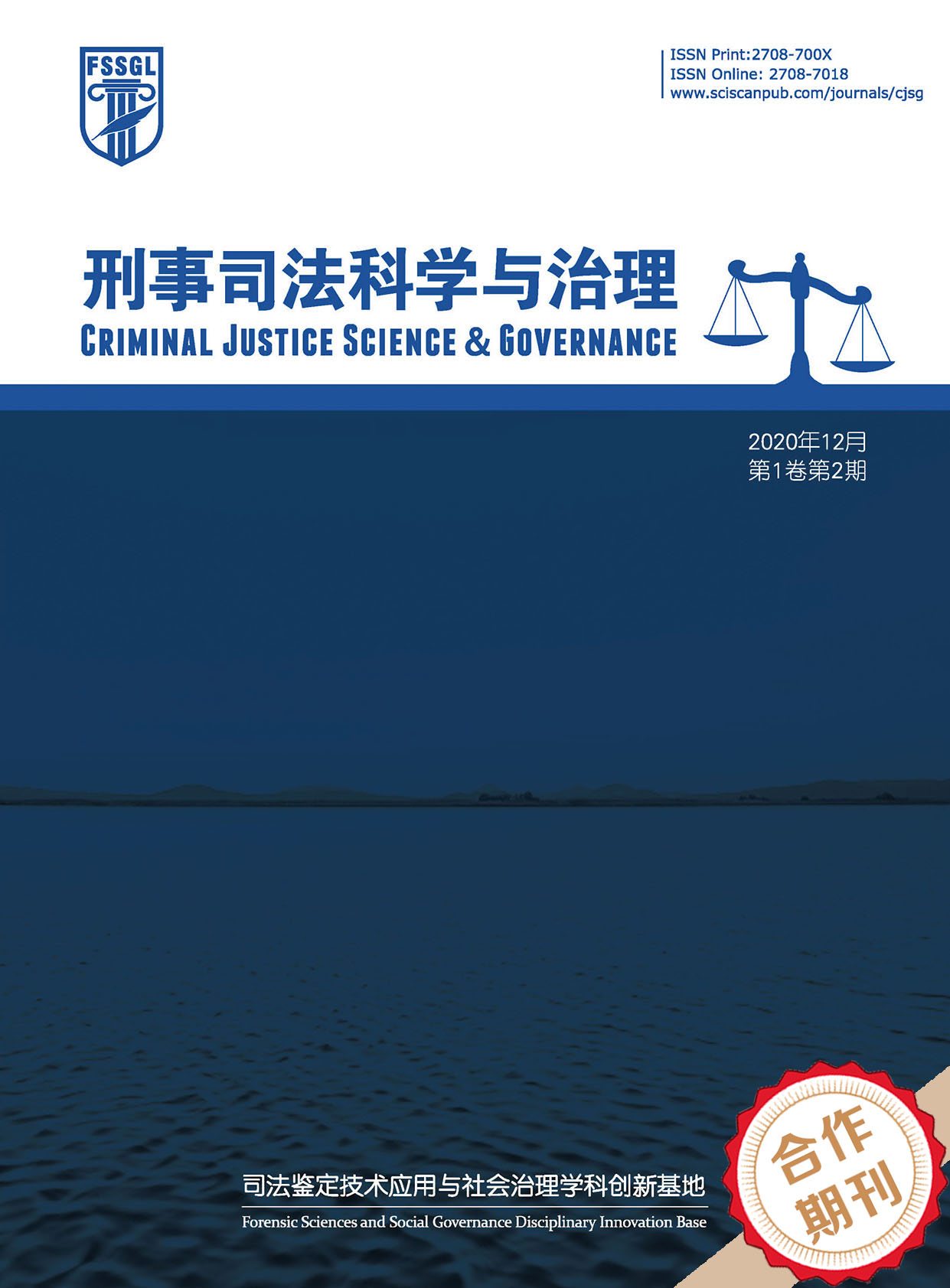Criminal Justice Science & Governance
新型网络犯罪背景下帮助信息网络犯罪活动罪中“明知”的理论审视与实践反思
Theoretical Analysis and Practical Reflection on “Knowing” in the Crime of Assisting Information Network Criminal Activities in the Context of Emerging Cybercrimes
- Authors: 黄彩旋¹ ²
-
Information:
1.中南财经政法大学刑事司法学院,武汉; 2.司法鉴定技术应用与社会治理学科创新基地,武汉
-
Keywords:
Knowing; Assisting information network criminal activities; Accomplice; Cybercrime assistance conduct明知; 帮助信息网络犯罪活动罪; 共犯; 网络犯罪帮助行为
- Abstract: To combat emerging cybercrimes and punish various forms of assistance in such offenses, the Amendment (IX) to the Criminal Law introduced the crime of “Assisting Information Network Criminal Activities”. With the issuance of judicial interpretations and the implementation of the “Card Severance Action”, its judicial application has surged. However, significant theoretical and practical disputes have arisen, particularly regarding the interpretation and determination of “knowing”. Issues include inconsistencies in definition, ambiguity in degree, and uncertainty about its object, stemming from the crime’s legal nature and the unique attributes of “knowing”. Recognizing this crime as an independent offense based on aiding conduct, and considering the special nature of “knowing”, its definition should be refined as “knowing or being aware of the possibility”, its degree clarified as “specific awareness or conditional general awareness”, and its object identified as “harmful conduct fitting a specific type of crime”. Additionally, “knowing” in this context is unidirectional and not limited by the stage of participation. These clarifications aim to ensure the precise and standardized application of this offense, strengthening the crackdown on cybercrime assistance. 为应对新型网络犯罪所带来的冲击,惩治各种新型网络犯罪帮助行为,《刑法修正案(九)》新增了“帮助信息网络犯罪活动罪”。在司法解释的出台和“断卡行动”的背景下,该罪的司法适用呈活跃之势。但该罪在适用中出现了诸多理论纷争与实践争议,其中最为突出的是该罪“明知”的理解与认定问题。该罪“明知”认定存在内涵不一、程度不清、对象不明的现实问题,其根源在于本罪的性质评价与“明知”的特殊属性。在确定本罪性质为帮助行为入罪的独立罪名,并综合考虑“明知”的特殊属性后,需界定“明知”的内涵为“知道或知道可能”,明晰“明知”的程度为“具体性认识或有条件的概括性认识”,厘清“明知”的对象为“符合具体犯罪行为类型的危害行为”,同时明确本罪“明知”单向且不受参与阶段限制,以便促进本罪的规范适用,更精确有力地打击各种网络犯罪帮助行为。
- DOI: https://doi.org/10.35534/cjsg.0601009
- Cite: 黄彩旋.新型网络犯罪背景下帮助信息网络犯罪活动罪中“明知”的理论审视与实践反思[J].刑事司法科学与治理,2025,6(1):76-87.
一、引言
随着网络社会的发展,以传统网络犯罪为基础衍生出的新型网络犯罪也在不断扩大发展,网络犯罪的实施手段、组织架构、行为方式出现了巨大的新变化,对犯罪治理体系形成了新的冲击。为更好地解决我国刑法在规制新型网络犯罪活动中出现的难题,更精确有力地打击各种网络犯罪帮助行为,2015年8月通过的《刑法修正案(九)》新增了“帮助信息网络犯罪活动罪”(以下简称帮信罪)这一罪名。以“案由:帮助信息网络犯罪活动罪”“案件类型:刑事案件”“文书类型:判决书”为检索条件在中国裁判文书网上进行检索,截至2024年11月21日,涉及帮信罪的文书总共有56024份。该罪在2016、2017、2018、2019年的案件量一直不超过三位数,但2020年的案件量开始出现“井喷式”增长,已然突破2530件,2021年的案件量甚至突破了五位数。诚然,相关文件的出台,确实细化了本罪的“明知”“情节严重”等构成要件,对于统一本罪的司法裁判尺度、消解本罪的法律适用分歧具有显著的制度价值。但本罪的适用在实践中仍存在一系列理论争议和实践难题,譬如本罪的性质界定不清、“明知”的认定模糊以及本罪与关联犯罪的关系不明。其中,对“明知”的规范释明和司法认定是本罪适用中的关键环节,其对罪与非罪的判定、罪轻与罪重的厘清起着不可替代的作用,甚至在实质上决定着此罪与彼罪的界分。但在司法实践中,本罪“明知”的认定存在具体内涵模糊、程度界定不明、对象范围不清等问题,严重影响了本罪的规范适用。本文拟通过梳理总结本罪实践中出现的问题并进行反思,对帮信罪的性质和“明知”的特性进行理论审视,在具体内涵、程度、对象方面把握本罪主观方面的认识因素,避免本罪的适用落入主观臆断和客观归罪的窠臼,以便发挥立法的预期作用,更好地治理新型网络犯罪。
二、反思与检视:“明知”认定的实践误区
对实践中本罪“明知”的认定进行反思与总结,司法实践中对帮信罪“明知”要件的认定存在四方面问题:一是“明知”认定内涵存在解释不一的问题,“可能知道”“知道可能”和“应当知道”混用;二是“明知”程度存在界定不清的问题,具体性认识和概括性认识均有;三是“明知”对象存在认定不明的问题,“犯罪”是否应当为满足罪量要求的刑事不法行为存在争议;四是本罪“明知”与其他关联犯罪的主观方面存在界分模糊的问题。通过多维度、多视角检视本罪“明知”的认定实践,方能系统深入地揭示其实践误区及实质成因。
(一)“明知”的内涵不一:可能知道、知道可能和应当知道混用
当前司法实践对本罪“明知”的具体内涵理解不统一,出现“可能知道”“知道可能”“应当知道”混用的情形。由于“可能知道”和“知道可能”本质上是相同的表述,司法实践中常常不区分二者,故本文将上述文书关于“明知”具体内涵的表述分为三类,即“明知”“可能知道或知道可能”和“应当知道”。一是法院在判决书中仅用“明知”笼统概括当事人的主观心态,没有详细解释“明知”的具体内涵。例如,在杨松帮助信息网络犯罪活动罪案中,该案法院认为“被告人杨松明知他人利用信息网络实施犯罪,仍为其犯罪提供支付结算帮助”,一审、二审法院均未对被告人“明知”的具体状态进行阐明。二是法院在判决书中阐明被告人对帮助对象的行为事实有高度盖然性的认知,即行为人认识到他人极有可能实施相关网络犯罪,此时被告人“明知”的具体内涵包括“可能知道”或“知道可能”。例如,在黄某龙帮助信息网络犯罪活动罪案和侯佳龙帮助信息网络犯罪活动罪案中,法院均采用了此类认定。三是法院在判决书中认为被告人的主观认识状态为“应当知道”。例如,在冼溪文、梁艺辉等诈骗罪案中,法院认为被告人冼溪文等人应当知道涉案App违法,“maomao”(李锋)等人在实施违法犯罪活动。综上,被告人的认识状态被表述为三种,即“可能知道或知道可能”“应当知道”和不作具体阐述的“明知”。“明知”的具体内涵在实践中存在理解分歧,表明了“明知”内涵认定标准的缺失,不利于司法机关对本罪行为人应然层面上“明知”的规范性判断,进而产生“明知”实然层面上个案认定不一的问题。
(二)“明知”的程度不清:具体性认识和概括性认识兼有
当前司法实践对被告人“明知”程度的认定是不明确的,即是否要求查明行为人知道被帮助人实施的具体行为性质。本文将实践中法院关于“明知”程度的认定意见分为两种:一种意见认为本罪的“明知”是具体、特定的,行为人对帮助对象及其行为性质有确切的认识,法院对于帮助对象行为的具体性质作出了明确的认定,如“明知他人利用电话卡实施网络诈骗”“明知提供银行卡是帮助他人用于网络赌博转账”和“明知牛玺岚利用其制作的网站实施传销活动犯罪”。另一种意见认为本罪“明知”是概括性的认知,法院通常仅需确定行为人认识到帮助对象在利用信息网络实施犯罪,而不需要具体核实行为人是否知道帮助对象的行为性质及其结果。例如,在王立东、迟明君等帮助信息网络犯罪活动罪案中,法院仅指出行为人对于帮助对象的犯罪行为是“明知”的主观心态。可见,司法实践对于被告人“明知”程度的认定存在一定的分歧,部分法院在判决书中点明被告人对被帮助人的行为性质确实存在具体的认识,而大多数法院不深入探究被告人是否知道被帮助人具体的行为性质。并且,在涉及两卡买卖、租借的案件中,这一点更为显著,法院一般认为行为人知道其向帮助对象出卖、租借等提供两卡的行为本身是违法的,进而推定出行为人知道帮助对象会利用银行卡实施信息网络犯罪,但鲜少审查行为人对帮助对象具体犯罪类型的认知程度。
(三)“明知”的对象不明:“犯罪”的内涵、形态理解纷争
本罪犯罪主体“明知”的对象是“他人利用信息网络实施犯罪”,而理论和实践对“犯罪”的理解与适用存在两个争议焦点。首先,争议聚焦于“犯罪”的内涵,学理方面主要存在三种观点:观点一认为“犯罪”应被解释为违法且有责的行为;观点二认为“犯罪”应被阐明为具备违法性且满足罪量要求的行为;观点三认为“犯罪”应被理解为包括符合刑法分则规定的构成要件的行为,不一定需要满足罪量要求。部分法院在认定帮助对象的定罪结果时,如在黄英豪、雷茂锡等诈骗罪案中,被帮助人黄英豪、雷茂锡等人构成诈骗罪,帮助人黄亮、黄伟等人构成帮信罪。部分法院则以“银行卡关联8起电信诈骗案件”“银行卡62×××51涉及韩毅网络赌博转款”等表述初步界定被帮助人的行为性质,没有具体阐明被帮助人的罪量程度,但在判决书中提及有关帮助对象的事实情节如银行卡内巨额交易流水的数额情节和多名被害人的结果情节。在“两卡”犯罪案件的侦办中,司法机关通常采用“被害人报案→立案侦查→追踪银行卡异常流水/涉案电话号码→锁定帮助人”的溯源路径。然而,受制于帮助对象跨境分布及帮助人认知局限等因素,侦查机关往往难以全面查证帮助对象的具体行为事实及犯罪程度。其次,也有法院模糊地界定帮助对象的行为性质和罪量程度,如“从事违法犯罪洗钱活动的上线团伙”“网络赌博犯罪活动”和“以上手游涉嫌违法犯罪”,或者法院完全不提及帮助对象的行为,仅提及本罪行为人为其提供技术支持、非法网络服务或支付结算通道,如陈正宁帮助信息网络犯罪活动罪案。争议焦点之二在于“实施犯罪”是否涵盖帮助对象的犯罪预备阶段。帮助对象未着手实施犯罪但本罪行为人着手实施帮助行为,行为人是否具有刑事可罚性存在分歧。在郑忠孝、古坚豪帮助信息网络犯罪活动罪案中,上诉人郑忠孝辩称“其所办理的银行卡并未进行网络犯罪活动”,法院也认定郑忠孝收购银行卡准备用于网络赌博等违法犯罪活动。可见本案中帮助对象的犯罪行为处于预备形态,而法院仍认定帮助行为人构成了帮信罪,该案也引发了对帮助行为可罚性的来源与基准的思考。
(四)本罪与他罪的竞合:“明知”与他罪主观方面界限模糊
实践中部分法院对帮信罪的“明知”与其他关联犯罪的主观方面认定界限模糊,进一步导致本罪和他罪如上游犯罪共犯、掩饰、隐瞒犯罪所得、犯罪所得收益罪(以下简称掩隐罪)的关系处理不明。如表1所示,一审和二审法院在被告人是否是事后帮助和是否知道系犯罪所得方面出现分歧,进而出现“帮信罪或掩隐罪”的罪名适用争议。若在案证据可以确实充分地证明行为人明知系犯罪所得,仍为他人提供转账等支付结算帮助,则法院往往认定其构成掩隐罪与帮信罪的想象竞合,择一重论处,如沈少东、赵宗源等帮助信息网络犯罪活动罪案。但也有法院在被告人的行为同时触犯以上两罪时对其行为进行分割评价,采取数罪并罚的判决思路,如孙小龙等帮助信息网络犯罪活动罪、掩饰、隐瞒犯罪所得罪案,法院认定被告人孙小龙构成帮信罪与掩隐罪,进行两罪并罚。与想象竞合择一处断的适用思路不同,该案对被告人实行数罪并罚,但无论从对被告人行为的分割处理角度还是从一行为触犯数罪的角度出发,都较难合理解释该判决结果。
表 1 一二审中帮信罪与掩隐罪的不同认定情况
| 案号 | 一审定性及说理 | 二审定性及说理 |
| (2021)桂01刑终769号 | 帮助信息网络犯罪活动罪 | 掩饰、隐瞒犯罪所得罪(与帮信罪构成想象竞合) |
| 明知是在帮助他人实施网络违法犯罪活动接收、转移资金的情况下将其名下的五张银行卡提供给他人使用 | 明知是电信网络诈骗犯罪所得,仍为他人接收、转移资金 | |
| 谢光扇的行为同时构成帮助信息网络犯罪活动罪和掩饰、隐瞒犯罪所得罪,依照法律规定掩饰、隐瞒犯罪所得罪处罚较重,即应以掩饰、隐瞒犯罪所得罪对谢光扇定罪处罚 | ||
| (2021)桂01刑终698号 | 帮助信息网络犯罪活动罪 | 掩饰、隐瞒犯罪所得罪(与帮信罪构成想象竞合) |
| 明知是在帮助他人实施网络违法犯罪活动接收、转移资金的情况下,在南宁市兴宁区房采用轮班制度,全天候的通过聊天软件Telegram(纸飞机)接收上游指令,利用团队提供的银行账户完成转账任务 | 知道所接收及转付的钱款可能是来源于网络赌博或者是其他违法犯罪所得的情况下,仍然按照上家的指令将涉案账户内违法犯罪所得的资金进行转移 | |
| 上诉人沈少东、原审被告人赵宗源、温荣钢、沈鹤群的行为即是为他人利用信息网络实施犯罪提供帮助的行为,也是对他人犯罪所得予以转移的行为 | ||
| (2021)川01刑终480号 | 掩饰、隐瞒犯罪所得罪 | 帮助信息网络犯罪活动罪 |
| 明知涉案资金系违法所得,在他人已经实施犯罪行为后帮助进行赃款转移 | 经查,首先在案证据证实,原审被告人主观上明知其系为他人利用信息网络实施犯罪提供帮助,并不明知其所提供帮助支付结算的资金系犯罪所得;其次,二原审被告人所提供的帮助,客观上是为上游信息网络诈骗最终取得财物提供帮助 |
除了帮信罪、掩隐罪主观方面的关系处理上存在争议外,本罪“明知”要件的认定与诈骗罪、传播淫秽物品牟利罪、开设赌场罪、组织传销活动罪等上游犯罪共犯主观要件的体系性界分亦存在实质困境。具言之,被告人在未与帮助对象形成共同故意即双向意思联络的情况下,明知其实施网络诈骗、传播淫秽物品、开设赌场等具体犯罪行为仍为其提供帮助,被告人应成立上游犯罪正犯的共犯抑或帮信罪的实行犯?此时存在较大争议。例如,在梁文祥等诈骗罪案中,一审检察院和法院认为被告人李钊洋明知他人实施诈骗仍为其制作虚假彩票网站并提供技术支持,实施了销售网站的行为,应构成诈骗罪的共犯,而二审法院则认为对李钊洋的行为以帮信罪定罪处罚更为恰当。在汤洪亮、严星帮助信息网络犯罪活动罪案中,一二审法院均认为被告人汤洪亮明知黎坚辉让其制作的“广东十一选五”彩票网站用于实施诈骗活动,为其提供网站搭建、运营维护等技术支持,仅构成帮信罪。然而,部分法院也认为,明知他人实施诈骗而提供帮助的行为人构成诈骗罪共犯,如陈冰冰、柯海聪等诈骗罪案。上述裁判分歧实质上反映出刑事立法对网络帮助行为的不法评价存在双重悖论:既需强化网络犯罪帮助行为的独立可罚性,又须避免共犯理论过度扩张导致的处罚泛化。这种价值衡平困境导致本罪“明知”要件的解释定位在共犯从属性与独立构成要件之间出现游移,本罪主观明知程度与关联犯罪的共犯意思联络的区分标准不明,亟待确立类型化区分标准。
三、梳理与辨明:“明知”认定问题的实质肇因
本罪“明知”在内涵、程度、对象以及与他罪主观方面的体系性界分方面都存在较大的适用争议。学界对上述问题虽有激烈的探讨,但对其中部分问题尚未作出较为系统、深入的挖掘。而本罪“明知”的认定对罪与非罪之界分、本罪与他罪之厘清有着重大的意义。这一现实需求与理论期待共同构成了推动本罪主观认定标准完善的动因。在解决“明知”的规范认定问题之前,需要先挖掘“明知”认定问题的实质肇因,探究其对“明知”认定的影响路径,针对存在问题的根由进行对症下药。申言之,一方面,本罪的性质界定对本罪主观方面的理解与适用起着实质影响作用;另一方面,本罪的“明知”因其认识的内容具备间接性、概括性和价值评价性,使得需要结合其特殊属性对“明知”进行理解和适用。
(一)本罪的性质争论:量刑规则说、帮助行为正犯化说抑或独立构罪说
对本罪性质的界定在学理上主要存在三种不同观点,即帮助犯的量刑规则说、帮助行为正犯化说和独立构罪说。定性不同直接影响到本罪构成要件的解释,决定了“明知”的理解与适用。持帮助犯量刑规则说的学者认为,帮信罪的设立属于帮助犯的量刑规则情形。其认为本罪行为人仅成立帮助犯,但由于本罪的设立,行为人脱离了刑法总则中共犯规定的控制,得以优先直接适用本罪。此时成立本罪要求行为人认识到帮助对象的具体行为性质及其结果,帮助对象的“犯罪”为不法层面上的犯罪行为。新增规定并未规定一个可以不依附于帮助对象而存有的罪名。具言之,本罪成立依托于帮助对象不法层面上的犯罪之成立,本罪行为人在主观方面需要满足知道被帮助人的具体行为性质及危害结果。根据共犯限制从属性说,帮助对象的“犯罪”行为需达到罪量要求,为不法层面上的犯罪行为。
持帮助行为正犯化的学者认为,为网络犯罪帮助行为配套独立的罪刑条款是立法将其提升为刑法分则规定的正犯行为的体现。帮助行为正犯化论者对帮助犯量刑规则说展开全面且尖锐的批判,反对的理由主要包括以下几点:一是帮助犯量刑规则说提倡者对帮助行为入罪的规定强硬地分类为三类情形,是一种不符合刑法体系解释规则的随意解释;二是将第287条之二界定为共犯规定外的处罚规定,会削弱刑法分则的罪名设定功能;三是将本罪规定界定为量刑规则,会虚置刑法总则有关共犯的处罚规定。深究帮助行为正犯化对该罪成立的影响路径,需先明晰帮助行为正犯化的含义有广义和狭义之分。狭义的帮助行为正犯化指帮助犯的正犯化或共犯的正犯化,即刑法将原来刑法分则中具体犯罪的帮助犯直接擢升为正犯,设置独立的罪刑结构。广义上来讲,帮助行为正犯化泛指帮助行为的入罪化,即一种通过新设或者修正罪名的方式对违法、犯罪行为的帮助行为予以入罪化的立法模式。若将本罪性质界定为帮助犯的正犯化,则本罪的成立需在主观上知道被帮助人的具体行为性质及危害结果,“明知”的对象“犯罪”需严格解释为违法且有责的犯罪行为或不法层面上的犯罪行为。若将本罪性质界定为帮助行为的正犯化,则本罪的成立不依附于正犯的成立,行为人主观上对帮助对象的行为认知不需达到具体明确的程度,“明知”的对象“犯罪”也不需遵从共犯从属性原理进行解释。
持独立构罪说的学者认为,本罪是具有“积量构罪”构造的独立犯罪。若本罪行为人实施多个帮助行为,单个行为不能满足本罪罪量要求,但多个行为可以被综合衡量为“情节严重”,仅成立帮信罪;若单个行为可以独立成立犯罪的,则构成本罪与帮助犯的竞合。其认为若定性本罪为帮助犯的量刑规则,本罪立法目的无法实现,不利于在网络共同犯罪司法认定困难的背景下有效规制新型网络犯罪;若界定本罪系帮助犯的正犯化,则缺乏法律依据和刑法理论支撑,对本罪的行为定性不当。在该性质前提下,本罪“明知”的程度不需要达到确定具体的程度,且“明知”的对象“犯罪”应被解释为“犯罪行为和符合刑法分则规定行为类型的严重违法行为”。综上,三种关于本罪性质的学说争议核心讨论点在于本罪与上游犯罪共犯的关系处理上,这影响着“明知”内涵、程度、对象的理解与认定走向不同方向 。
(二)本罪“明知”的特殊属性:间接性、概括性与价值评价性
1. “明知”的间接性
本罪“明知”的间接性指的是由于网络的特性,行为人无法直接感知帮助对象是否通过信息网络实施犯罪活动,因此他们对相关信息的了解大概率存在一定的不确定性。具言之,第一,新型网络犯罪模式高度链条化,本罪的实行行为一般处于新型网络犯罪行为的中下游环节。以占比帮信罪80%以上的“两卡”案件为例,提供支付结算帮助的行为人形成“卡农—卡头—卡商”三个等级,而该类案件的被告人多为提供本人或者亲友两卡的“卡农”或者“卡农”的组织者“卡头”,在层级化收卡体系中,行为人往往难以穿透犯罪层级直接知悉帮助对象的具体犯罪行为。第二,新型网络犯罪高度产业化,具有极强的隐蔽性、跨地域性、人员流动性。以电信诈骗为例,帮助对象直接实施诈骗行为如拨打诈骗电话、接受诈骗所得,本罪行为人通常完成其中不是核心板块的行为部分,难以直接得知核心犯罪行为的帮助对象的犯罪过程和危害结果。由此可见,网络犯罪固有的隐蔽性、跨地域性与链条化特征,客观上导致本罪“明知”要件具有显著的间接性特征,司法实践中难以要求行为人对被帮助行为的具体犯罪构成要件形成直接认知。
2. “明知”的概括性
本罪“明知”的概括性指的是“他人利用信息网络实施犯罪”的规定是一种笼统性表达,将他人可能利用信息网络实施的电信诈骗、开设赌场、传播淫秽物品、组织传销活动等形式多样的犯罪行为全部囊括进来。首先,刑法既往设置了其他以“明知……”作为主观方面的犯罪,其“明知”的对象是确定具体的。例如,持有、使用假币罪中的“明知是伪造的货币”和持有伪造的发票罪中的“明知是伪造的发票”,这两罪“明知”的对象是具体特定的物品。其次,以往“帮助行为入罪”的罪名中行为人认识的对象也为具体的犯罪行为或实施具体犯罪行为的人。例如,协助组织卖淫罪的帮助对象为“组织卖淫的人”,帮助恐怖活动罪的帮助对象是“恐怖活动组织、实施恐怖活动的个人,或者恐怖活动培训”。而本罪“明知”内容的限制词仅有“利用信息网络”,未明确“犯罪”的具体种类,“犯罪”几乎可以囊括符合刑法分则规定的行为类型的犯罪行为。可见,本罪“明知”的内容具有与其他传统犯罪的认识对象不同的高度概括性,该特殊属性引发了“明知”对象的解释纷争,同时也深刻影响着“明知”内涵、程度的认定。
3. “明知”的价值评价性
本罪“明知”的价值评价性指的是“明知”内容中的“犯罪”不是单纯的客观事实行为或者客观物品,而是有刑法上价值评价要求的行为,即应被评价为刑事上的不法行为。掩隐罪的犯罪主体“明知”的内容为“犯罪所得及其产生的收益”,理论和实践对该具有价值评价色彩的“犯罪”解释与适用争议颇多。而对本罪“犯罪”的理解,也存在着四种不同层次的观点,即严格解释说、扩张解释说、违法犯罪说、例外说,围绕着“犯罪”是否能包容解释为不法层面上的犯罪行为甚至符合刑法分则规定的行为类型的危害行为展开讨论。除了理论上的争议外,该特性所带来的证明难度和证明任务也较大。具言之,一方面从当事人的角度,若行为人对帮助对象的行为持漠不关心的态度,或者帮助对象有意隐匿其犯罪行为,行为人很难知道帮助对象的具体犯罪行为以及其犯罪行为是否构成违法且有责的犯罪行为或者不法层面上达到罪量程度的行为,行为人常以此为由辩称其不知道帮助对象的犯罪行为。另一方面从司法机关进行司法认定的角度,司法机关在案件中处于事后认定的时间点和间接认定的主体立场,主要根据被告人的陈述、证人证言以及其他证据直接证明被告人对帮助对象的犯罪行为存在“明知”。被告人的陈述是直接反映被告人主观状态的有强证明力的证据。但若被告人辩称其不知情帮助对象的行为构成犯罪或者甚至对帮助对象的行为都不知情,此时司法机关需通过间接证据形成完整的证据链证明行为人对他人的犯罪存在“明知”,证明难度较大。本罪“明知”内容的价值评价性使“明知”在当事人角度和司法机关角度都较难得到确证,并且是“明知”对象认定存在问题的实质影响因素之一。
四、厘清与突破:“明知”认定的完善建议
通过前文分析可知,本罪“明知”要件的认定困境实质源于双重因素的交互作用:本罪教义学定位的争议性及其“明知”要件的特殊认知结构。基于立法设定独立罪名的规范目的,本罪的性质应被界定为帮助行为入罪的独立罪名。此性质界定不仅契合网络犯罪帮助行为的独立可罚性特征,更为“明知”要件的规范解释奠定教义学基础。前述对本罪性质的评价观点在不同程度上存在一定的不足。量刑规则说直接绕开立法者的原意,把一项明确新设的罪名生硬地解释为量刑规则。该说认为帮助犯的成立不需要与正犯有双向的意思联络,则必然会推动共犯认定中的意思联络要件的稀释,从而削弱共犯成立的主观要件。量刑规则说和帮助犯正犯化说可以归为一类观点,即本质上都认为本罪是帮助犯。但一方面,根据传统共犯理论,正犯与共犯之间需有共同行为和共同故意,而本罪规制对象大多是与帮助对象无共同故意、行为联系弱的行为人,不能构成该理论意义上的帮助犯。另一方面,根据“新共犯论”,帮助犯的成立需要行为人明确具体地得知帮助对象的具体行为,但本罪的设立正是为了前置化打击更多与网络犯罪实行行为意思联络疏远甚至无意思联络,仅对帮助对象存在概括性认识的帮助行为人。上述两个观点仍否认了网络犯罪帮助行为的独立性和危害性,使本罪成立仍然依托于帮助对象犯罪的成立,而正犯的查证又在程序法上存在极大困难,这又让一切回到了问题的起点而非进入了问题的解决路径。但独立构罪说与广义的帮助行为正犯化说在核心观点上是一致的,都认为本罪是独立罪名。帮助行为的正犯化说是从该网络犯罪帮助行为被提升为独立罪名的过程角度理解本罪性质,而独立构罪说是从本罪被刑法分则规定后的结果角度来理解本罪性质。两种观点思考问题的角度不同,但都认为本罪是不依托于上游犯罪成立而成立的独立罪名。本文即认为帮信罪为网络犯罪帮助行为正犯化后的独立罪名,有其独立的保护法益即信息网络秩序,有独立的罪刑构造和犯罪竞合条款,是独立的犯罪。本罪的性质决定了本罪“明知”的解释与认定方向,并且“明知”的内涵、程度、对象的认定实际上相互交缠,关系密切。具言之,“明知”内涵和“明知”程度存在一定的交叉,“明知”程度的界定与“明知”对象的认定互相影响,而“明知”内涵、程度、对象方面的理解,又深刻影响着本罪与他罪如上游犯罪的共犯、掩隐罪的关系处理,可谓是牵一发而动全身。对本罪“明知”的规范阐释与认定需要使内涵、程度、对象三个维度互相协调,形成动态平衡的“明知”认定体系。
(一)确定“明知”内涵:知道或知道可能
本罪“明知”的具体内涵应确定为“知道或知道可能”,不应包括“应当知道”。“知道可能”需要几乎达到确定性的程度,即行为人几近确定地知道他人利用信息网络实施犯罪。具言之,首先,本罪“明知”的具体内涵首先被解释为“知道”。根据词典解释,“明知”的含义为“明明知道”,而“明明”在此作为修饰动词的副词,应解释为“显然如此”的意思,“明知”根据语义解释应直接解释为“知道”。其次,本罪“明知”的具体内涵包括“知道可能”。由于本罪“明知”具有极强的间接性、价值评价性、概括性,并且实践中行为人与帮助对象无意思联络或者意思联络极弱,行为人对帮助对象的行为性质的认识往往是基于自身行为性质、帮助对象的异常情况推断出帮助对象有极高可能性在实施某种或者某类犯罪行为。“知道可能”属于是一种对他人行为状态的高度盖然性的认知,即知道对方可能去做什么,“可能知道”指行为人内心对被帮助人的行为有一种盖然性认知,即猜测对方会去做什么,“可能知道”和“知道可能”在实践中内涵一致,都强调行为人对他人犯罪事实认知的可能性。但鉴于“可能知道”在语义上包含着“可能不知道”的另一面,此时对行为人定罪处罚违背疑罪从无的基本原则。因此本文采用“知道可能”作为描述行为人认知帮助对象行为状态的高度可能性的表述,并且这种盖然性认知需要几乎达到确定性的程度,应限定为“具体可能”,要求行为人必须有具体确定的判断依据相信法益侵害事实的发生。
此外,“明知”的涵义不应包括“应当知道”。“应当知道”通常被理解为刑法中“过失”的表述,表示一种以不知为前提但具有预见义务的心理状态。若把“应当知道”纳入“明知”的涵义范围内,可能会导致本罪的主观故意与过失犯的主观过失混淆。再者,通过梳理可知,将“明知”解释为“知道或者应当知道”的规定确实在相关司法解释中出现过,但是近几年的司法解释采取列举加除外的方式,明确“明知”的推定方法,而不直接解释“明知”的具体内涵。应当明确的是,“应当知道”的真正涵义应为推定故意。推定故意是指在没有直接证据证明的情况下,依据一定质和量的证据推定行为人是存有某种故意,但若行为人可以提出反证推翻该推定,则该推定故意不存在。“应当知道”应被“推定故意”这一表述所替代,它代表的是司法推定技术。在实务中,可以通过推定制度来认定“明知”的存在,从而解决“明知”认定难的问题。
(二)明晰“明知”程度:具体性认识或有条件的概括性认识
本罪“明知”程度的界定应根据具体案件事实进行分类界定,包括有条件的概括性认识情形和具体性认识情形。一般来说,行为人需要知道帮助对象的具体行为性质及其危害结果,但当行为人提供的帮助行为本身因违反相关行政法律法规甚至刑法具有违法性,或者其向被帮助人提供专门用于违法犯罪的工具、程序时,则可以结合行为人的供述、证人证言等证据推定行为人知道被帮助人利用其帮助行为实施网络犯罪活动,而行为人是否确知帮助对象的具体犯罪行为,不影响“明知”的认定,行为人可以通过提出反证来推翻该“明知”的推定。具体而言,当行为人提供专门用于违法犯罪的工具、程序如提供专门用于传销、赌博的网站,或者其提供的帮助行为本身具有违法性,如提供“两卡”时,行为人的“明知”可以被扩大解释为知道被帮助人必然或有极大可能利用该帮助行为实施网络犯罪,此时行为人持有一种概括性认识。当行为人提供的帮助行为本身不具备违法性,如为淫秽网站提供引流推广服务、普通支付结算服务时,则需要综合全案证据事实认定行为人确知被帮助人的犯罪行为,即行为人需要认识到帮助对象的具体行为性质及其可能造成的危害结果。一般来说,行为人在提供中立业务行为时,只有知道被帮助人实施的具体帮助行为,才能对被帮助人的行为是否为犯罪行为做进一步的价值评价,此时需要顾及“明知”内容的价值评价性对“明知”程度进行考虑。需要明晰的是,行为人仅在知道被帮助人的具体犯罪行为仍为其提供具有中立性质的帮助行为时,其中立帮助行为不再是“中立”的,成为在本罪处罚范围内的网络犯罪帮助行为。总而言之,本罪“明知”的程度一般理解为知道帮助对象的具体犯罪行为,“明知”为具体性认识。例外的是,当行为人提供的帮助行为本身具有违法性时,“明知”程度被扩张理解为知道被帮助人可能或必然利用该帮助行为实施网络犯罪活动,此时的“明知”为概括性认识。
(三)廓清“明知”对象:符合具体犯罪行为类型的危害行为
本罪“明知”的对象应被界定为“符合具体犯罪行为类型的危害行为”。首先,前文已经界定了本罪的性质为帮助行为入罪的独立罪名,在此前提下,本罪的成立不需要遵循共犯从属性,以帮助对象犯罪成立为成立要件,客观方面的独立性一定程度上影响了主观方面的理解与认定。但是,根据该罪构成要件行为的特殊规定,该罪所规制的帮助行为在事实意义上的从属性仍然存在,并且“犯罪”的概念是刑法中独有的概念,该概念的解读不可突破刑法构成要件类型的制约,“他人利用信息网络犯罪”不能被极度扩张地解释为“他人利用信息网络实施违法行为”。其次,本罪的“明知”具有概括性、间接性、主观性、价值评价性,若苛求行为人对帮助对象的行为进行刑法意义上的价值评价,衡量帮助对象的行为是否违法且有责,或者是否满足罪量程度,显然是不现实的,会大大缩小该罪的处罚范围,不符合该罪的立法目的与定位。再者,在行为人漠不关心的态度和帮助对象有意隐匿其犯罪行为的情况下,行为人往往只能意识到帮助对象的行为是刑法分则规定的某种或某类犯罪行为。因行为人的认识能力限制,行为人很难认识到帮助对象的行为是否构成违法且有责的犯罪,或者是否达到罪量程度,并且实体上的犯罪成立需要经过司法机关进行程序法上的证明和认定,这显然不在行为人的认识范围内。因此,本罪“明知”的对象“犯罪”应被解释为符合具体犯罪行为类型的危害行为。
(四)界分本罪与他罪:单向且无参与阶段限制的“明知”
要厘清本罪与上游犯罪共犯、掩隐罪的关系,须明确本罪“明知”具有单向性,“明知”可以存在于帮助对象犯罪的全过程,即事前、事中或事后,不存在参与阶段限制。首先,上游犯罪的共犯需要与正犯存在双向的意思联络,且意思联络应当发生于事前或者事中。传统共同犯罪理论认为,共同犯罪的成立以二人以上存在共同犯罪行为和共同故意为必要的成立条件,也就是说帮助犯和正犯之间需要存在双向的意思联络,彼此知道对方的存在。并且帮助犯的认识内容具有双重性,一是知道正犯的行为性质、危害结果;二是知道自己在为正犯提供帮助,知道自己帮助行为的性质及危害结果。而本罪主观方面只要求行为人单方面认识到帮助对象的行为,不需要和帮助对象形成双向的意思联络,本罪“明知”具有单向性。鉴于我国现行刑法规范尚未确立片面共犯制度,当行为人仅单方明知帮助对象实施具体犯罪而缺乏共同犯罪故意时,其行为仅构成本罪;若行为人与帮助对象形成双向犯意联络并对特定犯罪达成合意,则构成上游犯罪共犯,此时产生本罪与上游犯罪帮助犯的想象竞合,应依从一重处断原则处理。
其次,关于帮信罪与掩隐罪的区分应当在主观方面区分行为人是否知道系犯罪所得及其收益,并且掩隐罪行为人“明知”的时间点在帮助对象犯罪既遂后,而本罪犯罪主体“明知”不受参与阶段限制。犯罪所得,是指上游犯罪行为人通过犯罪行为所获得的财物(赃款或赃物),是实施犯罪行为追求的目的物;犯罪所得收益,是指上游犯罪行为人将犯罪所得用于合法或者非法投资、经营等活动所形成的各种经济利益。根据上述定义可以得知,掩隐罪行为人认识到的是他人犯罪所获得的财物及其形成的经济利益,且掩隐罪的“明知”应发生在犯罪人犯罪既遂后。若行为人仅知道为帮助对象的犯罪行为提供支付结算帮助,此时行为人仅构成帮信罪;若行为人知道系帮助对象犯罪所得,且“明知”发生在上游犯罪既遂后的阶段,此时行为人构成帮信罪与掩隐罪的竞合,择一重处罚。
五、结语
网络犯罪呈现产业化、链条化、层级化的发展态势,网络犯罪帮助行为的社会危害性显著提升,并且帮助者与被帮助者联系减弱,被帮助者的犯罪行为查证困难,传统共同犯罪理论已无法有效规制网络犯罪帮助行为。为了更准确、有效地打击各种网络犯罪帮助行为,维护信息网络秩序,保障信息网络健康发展,经过较长时间的实践积累与立法酝酿,立法机关通过《刑法修正案(九)》创设帮助信息网络犯罪活动罪这一独立罪名,以预防性立法模式弥补传统共犯制度应对新型网络犯罪的规制盲区。随着司法解释的有效出台及“断卡行动”的深入推进,该罪的司法适用呈活跃之势。但该罪在适用中出现了引起学界和实践困惑的诸多问题,其中最为典型的是该罪“明知”的认定问题。本文通过对该罪“明知”认定存在的问题进行反思和检视,总结该罪“明知”认定存在内涵不一、程度不清、对象不明的现实问题,挖掘问题的真正肇因:本罪的定性争议与“明知”的本身特性。基于两个实质影响因素,先确定本罪性质为帮助行为入罪的独立罪名,在性质前提下明确“明知”的内涵为“知道或知道可能”,明晰“明知”的程度为“具体性认识或有条件的概括性认识”,廓清“明知”的对象范围是“具体犯罪行为类型的危害行为”,同时明确本罪“明知”的方向和时点,以便更好地处理本罪与他罪的关系。在司法适用层面,应充分关注本罪主观要件的特殊性,坚守主客观相统一原则,把握好客观行为通向主观推定的路径,防范“主观归责”与“客观归罪”的双重风险,最终实现新型网络犯罪治理的规范化与精准化。
















